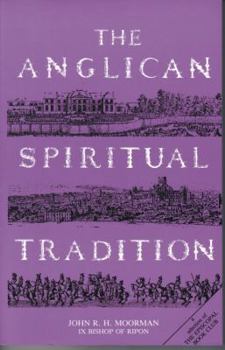The Anglican Spiritual Tradition
No Synopsis Available.
Format:Paperback
Language:English
ISBN:0872431398
ISBN13:9780872431393
Release Date:January 1985
Publisher:Templegate Publishers
Length:228 Pages
Weight:0.66 lbs.
Customer Reviews
2 ratings
Anglicanism as Religious Spirituality/Spiritual Religiosity
Published by Thriftbooks.com User , 19 years ago
The title of this book may very well mislead a number of persons. "The Anglican Spiritual Tradition" is very much about Anglicanism, but it is not about "spirituality" at the expense of history and theology - it is not about spirituality without religion. Rather, Anglican spirituality *is* Anglican religion, just as Anglican religion *is* Anglican spirituality. Thankfully, Bishop Moorman avoids this all-too-popular Gnostic split between time (ie, religion) and the eternal (ie, spirituality). The Anglican Spiritual Tradition begins on the eve of the Reformation. One of the things that Moorman does well is to note how utterly chaotic the Reformation was on laity, priests, bishops and archbishops - each in their own unique way. Rather than writing a history of Anglican religion-spirituality from the top (ie, dealing with the great theologian-mystics and leaving it at that), Moorman catalogues the various ways that all members of the English church were effected and the ways that their interactions with each other shaped Anglicanism. In many ways, Moorman's history is a social history; it is a welcome departure from the "great man" approach (for me, at least). Moorman begins at the eve of the Reformation, moves through the English Reformations under Henry VIII, Edward VI, Mary and Elizabeth and the on into the Anglican Divines. He pays special note to Richard Hooker, oftentimes called the "prophet of Anglicanism", and to the development of Anglicanism as the via media (Latin for "middle way") - not out of complacency, but out of necessity! Puritanism/Calvinism was seen as being just as dangerous as Roman Catholicism and the "via media" was about steering in between dangerous excesses. Anglicanism is seen here as to really be able to make good on its claims to be part of the "one, holy, catholic and apostolic Church" (as the Nicene Creed puts it). Moorman is not afraid to reveal some of the odder, more radical discontinuities between those "up top" in the episcopacy and the laity, though. He discusses William Laud's catholic revivals side-by-side with the influence of Puritan writings such as John Bunyan's The Pilgrim Progress. Moorman discusses John & Charles Wesley's very catholic evangelicalism, with its high sacramentality wed to the Protestant experience of being justified in an existential moment immediately after, revealing how antitheses may very well lead to some wonderfully fresh syntheses. It is the 19th century Oxford Movement that is next on Bishop Moorman's list of topics. He details a number of the liturgical shifts that came about with this movement, as well as some of the retrievals (or, attempted retrievals) of medieval catholicism as being a part of the Anglican imagination. One of the things that is done really well with this book is the noting of how liturgical developments often reflected changing attitudes and further served to change attitudes; a reaffirming of historic tradition among the laity was one of th
A spiritual path
Published by Thriftbooks.com User , 20 years ago
John Moorman led an interesting ecclesial and academic life. As bishop of Ripon, he was a senior Anglican churchman, and was made the principal Anglican Observer to Vatican II. He was also in charge of the Chichester Theological College, and a member of ARCIC (the Anglican/Roman Catholic International Commission) working for greater ecumenical relations. Despite these administrative and pastoral charges, Moorman still found the time to explore the deeper aspects of Christian spirituality, concentrating on Franciscan spirituality as well as the subject of this volume, the unique characteristics of Anglican spirituality.One of the more interesting parts of Moorman's discussion of Anglican spirituality from the Reformation to the present is his ability to weave narrative theological devices into his overall historical study. The book begins with the story of the Rev. James Whyte as a prologue. Whyte (a fictional character) was a priest during the time stretching from when King Henry VIII was still a staunch Roman Catholic (Defender of the Faith, no less) to the early days of Queen Elizabeth. This is a fascinating period of flip-flop in the Church of England, and seen from the perspective of an 'average' country parson rather than the political intrigues of court, it gives a good deal of insight into some of the formative sensibilities of the Anglican ethos. The early days were informative for overall Anglican spirituality because it is here that it makes its distinction from older forms of Catholic spirituality; for all the criticism that Anglicans endure at not giving proper respect and weight to scripture, Moorman identifies the advent of the Bible in English, accessible to all the people, as a key part of Anglican spirituality. Moorman gives a brief history of the early development of the English Bible and its general acceptance. Another key aspect is the Book of Common Prayer, another book slowly developed, that continues to have the primary shaping aspect to Anglicans worldwide, even as they use variations quite different from the original (or originals) from this early period. Key to the development over time of the Book of Common Prayer has been an attempt (one meaning of the Via Media) to chart a path that enables Catholics and Protestants to worship together according to the will of God. Theologically speaking, the reformation in England had a different basis from continental reformers. Whereas for Luther, Calvin, Zwingli and others on the continent, their reforms came through their theological difficulties with the dominant church, and this resulted in a formal break. In England, the formal break came first -- in many ways, Henry VIII would have been a contented Roman Catholic in all but papal allegiance; the development of more Protestant-oriented theologies came as a result of the break, rather than vice versa.Moorman traces developments of spirituality from these origins through the different periods of Anglicanism -- he lo





